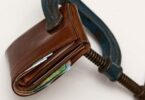Your understanding of personal finance as an African immigrant in the U.S. will significantly influence your success if you know what I mean. What you have to understand is that America is a credit society where you can get almost everything on credit. The catch in that is, if you failed in your personal finance, you might not be creditworthy which means no credit company will be ready to support you.
From mortgage to cars to other personal items and even your education can run on credit if you maintain creditworthiness over time. The beauty of being creditworthy is that you can substantially reduce your interest rate and get credit at cheap rates which can mean a lot in your personal finance.
Another reason every African immigrant needs to learn personal finance is that it is not a core attitude in Africa. I don’t mean to demean us, but we live in a society where prices can rise and fall without reasonable cause; things just go up and down like ocean wave. More so that record keeping is alien with us, people can do anything and go unpunished but that is not the situation in your new country of residence, and so it is vital you learn personal finance the American way.
For you to understand personal finance, it is essential to understand the need for some resources that would enhance your efforts at financial discipline. Here are personal finance essentials you need to maintain:
A bank account
Having a bank resource would improve your financial control. Bank is a safe way to keep your money and caution excessive spending. A bank is a service-oriented institution, and your savings culture will help to judge your financial discipline and give the bank the confidence about your ability to manage credit. Also, many services such as mortgage, car loan, pay-day loan, etc., you will need in the U.S. would need your bank’s recommendation and support.
Therefore, as an African immigrant, your first task at personal finance should be to open a bank account. There are two possible accounts, savings and checking accounts to open with a bank; I am sure you are already used to these types of accounts in your home country; it is the same in the U.S.
Debit card
The debit card needs no introduction to people who have used what is called ATM cards in Africa; it is a card issued on checking account by most banks to allow depositors get cash whenever they need it to buy things they like. It comes as a Visa or MasterCard branded card that gives you access to money in your bank account.
It is essential to manage your debit card judiciously to build a reliable credit history to show your bank you can maintain a credit card, reliably, if issued. In the U.S. it is more convenient to carry your card than carrying cash; most vendors including your favorite African restaurants accept payment using your debit card. And when you need cash, just in case, you can withdraw some money using your debit card at the nearby cash dispensing (ATM) machine.
Checks
While this is not very popular in Africa, although it is not a common thing to find with regular people in the U.S. as well, apart from established business people; however, checkbook is integral to the U.S. money management culture and allows you to pay bills. You could request your bank to issue a checkbook if you deem it worth using.
Establishing a credit history
Establishing a reliable credit history would accelerate getting a credit whenever you need it. You would at one point need a mortgage, a car loan or need someone to pay for your student loan; anything that has to do with a loan from the bank or a credit institution will look at your credit history to determine if you are not a credit risk.
Your credit information is built on how you manage whatever credit or any financial transaction you have had with people who reported your credit transaction to the monitoring agencies through Credit Report. It doesn’t matter how creditworthy you are in Africa where you came from, that ends in your country anyway! You need to start anew to build a new credit history that follows the U.S. procedure.
Your credit report shows your credit history, how you pay your bills and confirm if you have ever been bankrupt or not. Your Credit Report also indicates if you have had any financial judgment against you in the past for defaulting on your expected payment for a home or car loan, or whatever credit history it was.
All your credit histories, both good and bad, will be sent to Credit Bureaus by the various creditors you have had financial transactions with; it is from the credit bureaus that your credit report will be generated when you need it or when a creditor you just applied to is conducting due diligence on your application. To have a good credit score, you need to build a clean credit history in your every day financial handling.
Credit cards
When you need a credit card, your credit history has a lot to do with how much credit limit you will be allowed by your credit card company. Unlike a debit card that is tied to your bank checking account, a credit card is a standalone credit facility with a pre-set credit limit; and how much your pre-set limit will be is a result of your credit history. A credit card is allowing you to spend the money you don’t have and expect to pay back as and when due with interest. But as I said earlier, the credit card is a vital facility in a credit-based society like America; you may not survive for too long without credit. Your personal finance discipline will go a long way to make life comfortable for you using a credit card.
There is more to credit than meet the eye and it’s a whole school you need to graduate from to understand how this works. Before concluding this discussion, let me run you through tips to enhance your personal finance and build a credible credit history.
Tips to build an excellent personal finance attitude:
– Avoid impromptu spending. One way to get in trouble with your personal finance is to spend unplanned; always make sure to plan your expenses and postpone the unplanned wait till a later date.
– Make provision for an emergency. Urgent situation spending is a fact of life, and as you earn income, it would be wise to set some funds aside for unexpected expenses.
– Always negotiate. While many of us feel terrible negotiating what we want to buy, make it a habit of haggling anything you want to spend money on; you could get some discounts which would make your scarce resources more valuable.
– Avoid illegal transactions. Anytime you want to buy anything; it is best to go to the right place where it is sold than to patronize people behind the scene. Such could land you in trouble and lead to spending more than you are saving right now or lose your money.
– Bank before spending. If you work where you are giving cash for your labor, develop the habit of banking your money before spending it; that way you can better account for your expenses.
Mikhail Adeoye
Mikhail is a content creator, a digital marketer, and an entrepreneur. He studied Political Science at the University of Ilorin Nigeria.








